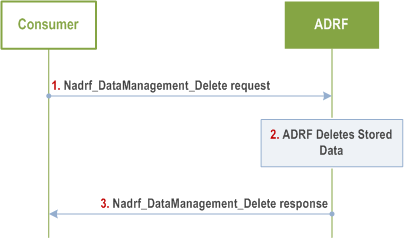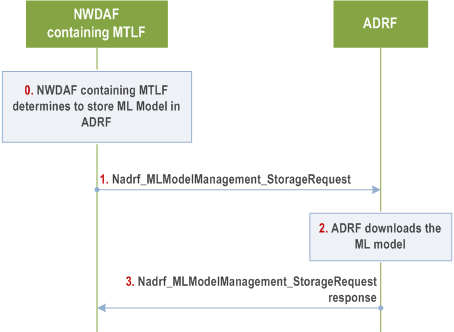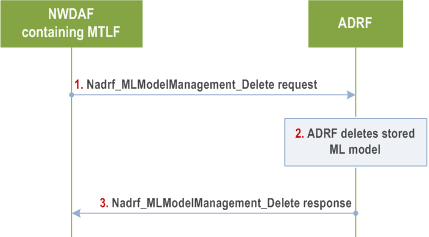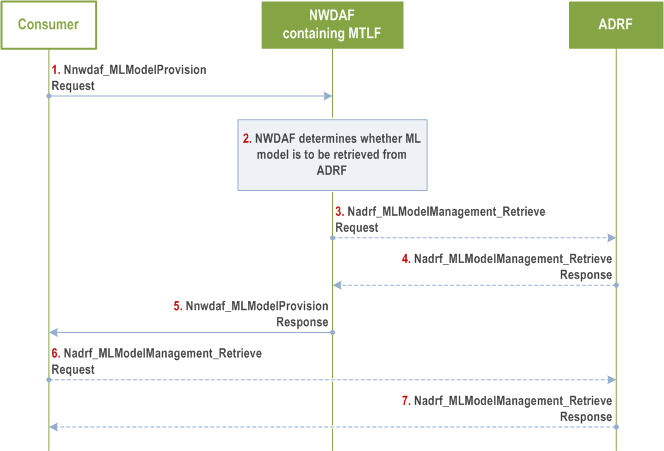Content for TS 23.288 Word version: 18.6.0
1…
4…
5…
5A…
6…
6.1.3
6.1.4…
6.1.4.4…
6.1.5…
6.1A…
6.1B…
6.1B.2.3…
6.1C
6.2…
6.2.3…
6.2.6…
6.2.6.2
6.2.6.3…
6.2.6.3.3
6.2.6.3.4
6.2.6.3.5
6.2.6.3.6…
6.2.7…
6.2.8…
6.2.9…
6.2.13…
6.2A…
6.2B…
6.2B.3
6.2B.4…
6.2C…
6.2D…
6.2E…
6.2F…
6.3…
6.4…
6.5…
6.6…
6.7…
6.7.3…
6.7.4…
6.7.5…
6.8…
6.9…
6.10…
6.11…
6.12…
6.13…
6.14…
6.16…
6.17…
6.18…
6.19…
6.20…
6.21…
7…
7.4…
7.7…
7.9…
8…
9…
10…
6.2B.4 Data removal from an ADRF
6.2B.5 ML Model Storage in ADRF
6.2B.6 ML Model removal from ADRF
6.2B.7 ML Model retrieval from ADRF
...
...
6.2B.4 Data removal from an ADRF p. 131
The procedure depicted in Figure 6.2B.4-1 is used by consumers (DCCF, NWDAF) to remove data previously stored in an ADRF.

Step 1.
A consumer requests that specified data be deleted from the ADRF using Nadrf_DataManagement_Delete request service operations. The request may include the DataSetTag attribute which the stored data records are associated to.
Step 2.
The ADRF deletes all copies of the stored data.
Step 3.
The ADRF indicates the result (i.e. data deleted, data not found, data found but not deleted) using Nadrf_DataManagement_Delete response service operations.
6.2B.5 ML Model Storage in ADRF |R18| p. 132
The procedure depicted in Figure 6.2B.5-1 is used by NWDAF containing MTLF to store ML Model in an ADRF.

Step 0.
NWDAF containing MTLF determines to store ML Model in ADRF based on MTLF policy.
Step 1.
NWDAF containing MTLF requests to store a (set of) ML Model(s) to the ADRF by invoking Nadrf_MLModelManagement_StorageRequest service, optionally including allowed NF instance list for the ML Model identifier as described in TS 33.501.
Step 2.
The ADRF locally maintains the association between the ML Model identifier and the NF instance ID of NWDAF containing MTLF and allowed NF instance list (if there is any in step 1).
[Optional] If instead of the ML Model(s), the ML Model address(es) is/are included in request, ADRF downloads the ML Model(s) based on the ML Model address(es) and locally stores the ML Model(s).
Step 3.
The ADRF sends Nadrf_MLModelManagement_StorageRequest Response message to the consumer including the ML Model storage result indication.
6.2B.6 ML Model removal from ADRF |R18| p. 133
The procedure depicted in Figure 6.2B.6-1 is used by NWDAF containing MTLF to delete ML Model from an ADRF.

Step 1.
NWDAF containing MTLF requests to delete the ML Model(s) previously stored in the ADRF using Nadrf_MLModelManagement_Delete request service operation.
Step 2.
The ADRF deletes both the stored ML Model(s) and related ML Model information.
Step 3.
The ADRF indicates the result (i.e. ML Model deleted, ML Model not found, ML Model found but not deleted) using Nadrf_MLModelManagement_Delete response service operation.
6.2B.7 ML Model retrieval from ADRF |R18| p. 133
The procedure depicted in Figure 6.2B.7-1 is used by consumers (NWDAF containing MTLF and NWDAF containing AnLF) to retrieve ML Models from an ADRF.

Step 1.
The NWDAF service consumer (NWDAF containing AnLF or NWDAF containing MTLF) subscribes/requests for a (set of) trained ML Model(s) associated with a/an (set of) Analytics ID(s) by invoking the Nnwdaf_MLModelProvision_Subscribe / Nnwdaf_MLModelInfo_Request service.
Step 2.
The NWDAF containing MTLF determines whether the set of ML Model(s) associated with a/an (set of) Analytics ID(s) should be retrieved from the ADRF.
When NWDAF containing MTLF authorizes the NF consumer to retrieve the ML Model(s) stored in the ADRF directly, steps 3 and 4 is skipped.
If NWDAF containing MTLF determines that the set of ML Model(s) corresponding Analytics ID(s) requested in step 1 needs to be retrieved from ADRF and the NF consumer is agnostic to where the ML model(s) is stored, then Steps 3 and 4 is performed.
Step 3.
The ADRF service consumer (NWDAF containing MTLF) requests for the ML Model stored in ADRF by invoking the Nadrf_MLModelManagement_RetrievalRequest Request (Storage Transaction Identifier or one or more unique ML Model identifier(s)) service operation.
Step 4.
The ADRF verifies the service consumer (NWDAF containing MTLF) as described in Annex X.10 of TS 33.501. If verification is successful, the ADRF sends Nadrf_MLModelManagement_RetrievalRequest Response (ML Model file address of Model file(s) stored in ADRF) service operation.
Step 5.
The NWDAF containing MTLF notifies/ response to the NWDAF service consumer with the tuple Analytics ID, one or more tuples of unique ML Model identifier and ML Model Information. The ML Model information may contain the ML Model file address or ADRF (Set) ID. The ADRF(Set) ID is included only when the NWDAF containing MTLF authorizes the NF consumer to retrieve the ML Model(s) stored in the ADRF in step 2. When ADRF (Set) ID is provided and the NWDAF containing MTLF authorizes the NF Service Consumer to retrieve all ML Models corresponding to a Storage Transaction ID, the Storage Transaction ID may be provided. In other cases, the NWDAF containing MTLF only provides ML Model identifier(s).
Step 6.
If in step 5, the NWDAF service consumer (NWDAF containing AnLF or NWDAF containing MTLF) received ADRF (Set) ID (where the ML Model(s) requested in step 1 is stored) and/or the ML Model provide indicator, then the NWDAF service consumer may invoke the Nadrf_MLModelManagement_RetrievalRequest (Storage Transaction Identifier or one or more unique ML Model identifier(s)) service operation to get the ML Model stored in ADRF.
Step 7.
The ADRF verifies the service consumer as described in Annex X.10 of TS 33.501. If verification is successful, the ADRF sends Nadrf_MLModelManagement_RetrievalRequest Response (ML Model identifier(s) and address(es) of Model file(s) stored in ADRF to the NWDAF service consumer.